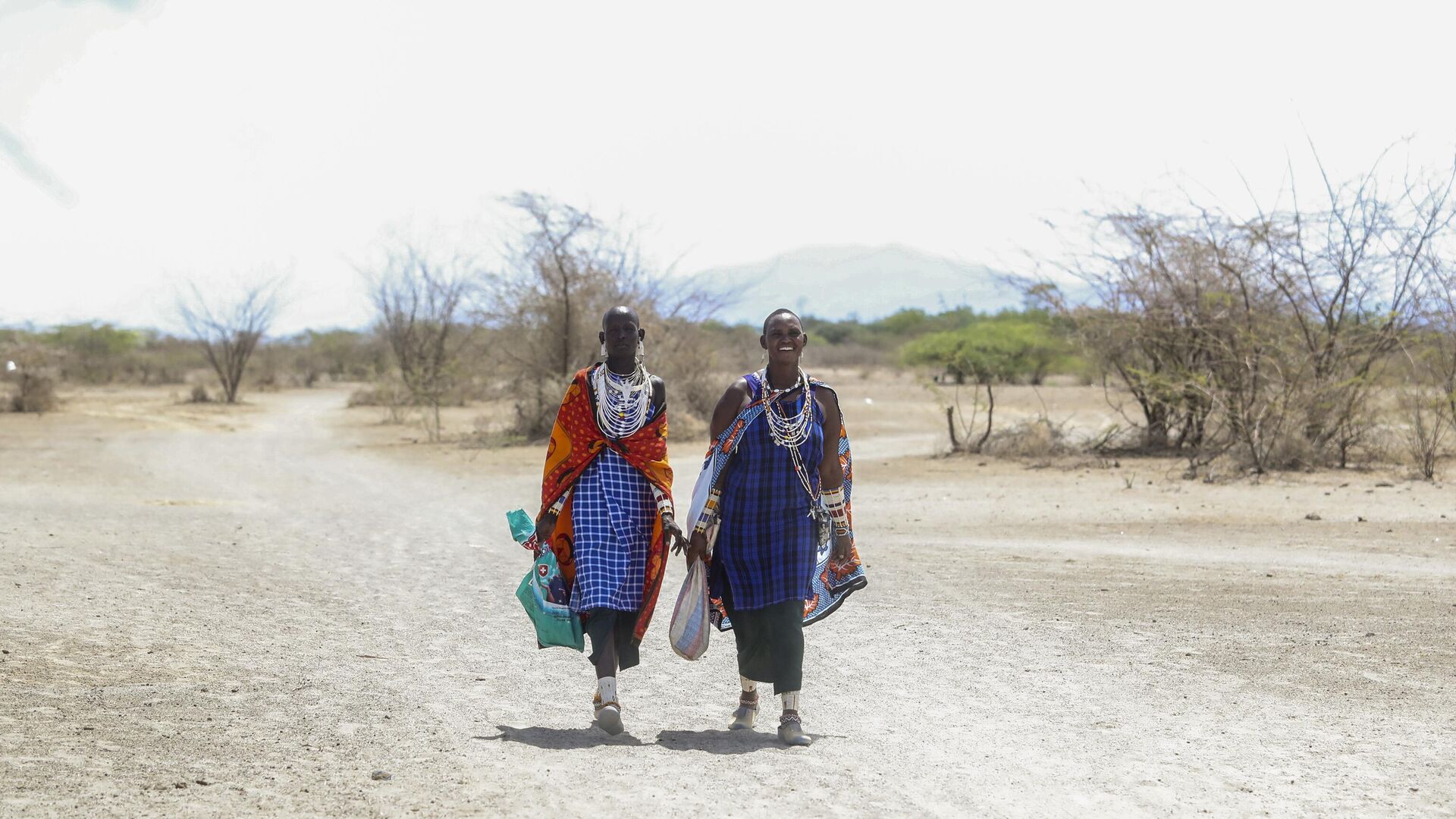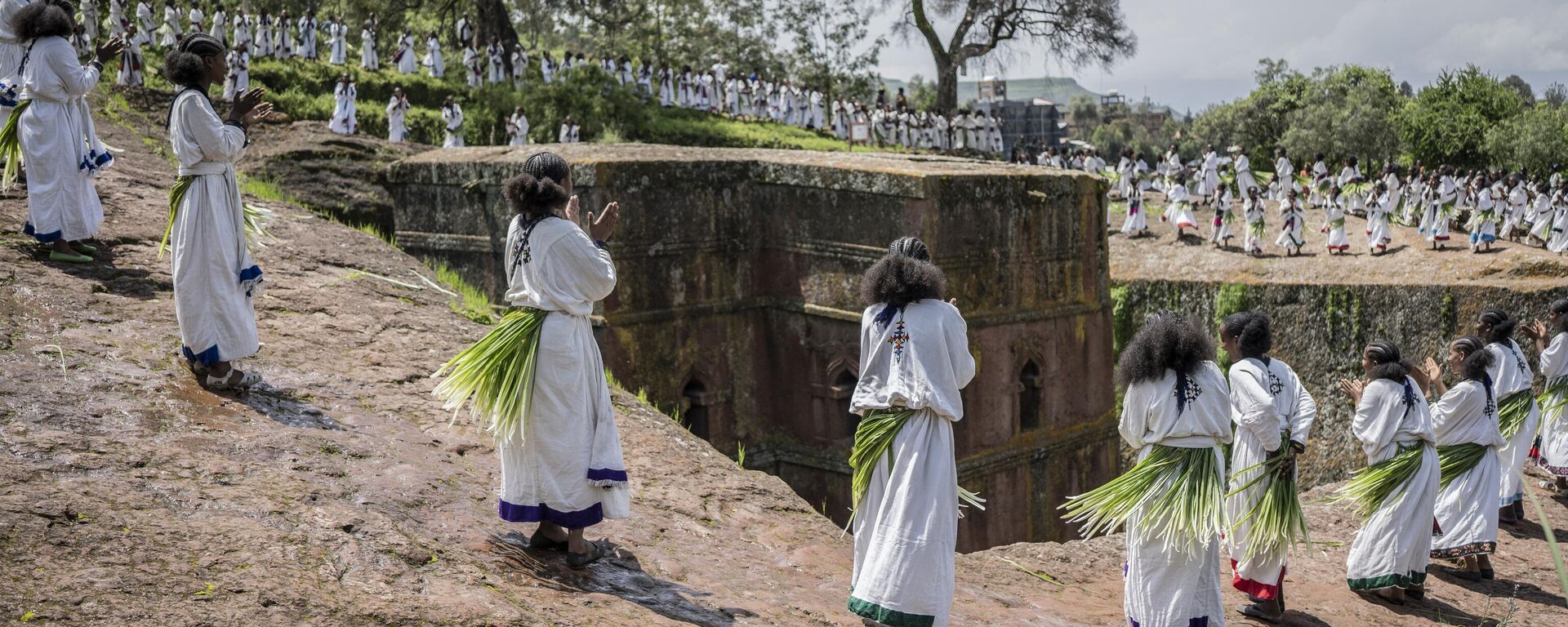https://en.sputniknews.africa/20240619/how-unescos-actions-impact-indigenous-lives-in-african-parks-1067127354.html
How UNESCO is Complicit in Human Rights Abuses in Africa's National Parks
How UNESCO is Complicit in Human Rights Abuses in Africa's National Parks
Sputnik Africa
For years, human rights groups have accused UNESCO of ignoring or being complicit in serious abuses like illegal evictions and allegations of torture, rape... 19.06.2024, Sputnik Africa
2024-06-19T19:30+0200
2024-06-19T19:30+0200
2024-06-20T10:36+0200
republic of the congo (congo)
unesco
tanzania
united nations (un)
sub-saharan africa
central africa
east africa
national park
wildlife
heritage
https://cdn1.img.sputniknews.africa/img/07e8/06/13/1067127178_0:0:3072:1728_1920x0_80_0_0_671fa91036b4b46322a4f0b58ad839ce.jpg
A recent report from indigenous rights organization Survival International revealed that UNESCO has supported the illegal eviction and abuse of Indigenous peoples in several World Heritage Sites, including African parks like Ngorongoro in Tanzania and Odzala-Kokoua in Congo. A human rights organization claims that UNESCO grants these parks World Heritage status despite reports of torture, rape, and murder by rangers, citing a lack of enforcement mechanisms for human rights and demands for population control and internal policies as reasons. Since September 2023, UNESCO has required countries to get consent from Indigenous peoples in protected areas, following the World Heritage Convention and UN guidelines. However, despite not getting consent from the Baka peoples in Odzala-Kokoua National Park in the Republic of the Congo, the Congolese government still received World Heritage status for the park, the report said.A UNESCO spokesperson told the news platform it “strongly contests” the statements made by NGOs about the World Heritage Convention.John Knox, former UN special rapporteur on human rights and the environment, told Mongabay that being listed as a World Heritage Site holds significant value for many countries. Rosalie Matondo, the Republic of Congo’s Minister of Sustainable Development, Forest Economy, and Environment, echoed this sentiment.She explained to the news platform that international recognition of a site like Odzala-Kokoua National Park reassures both the local community and those who wish to support the Congo Basin and preserve the heritage site.However, according to Mongabay, there's debate about how much this actually helps sustainable development projects for local communities. Since 2012, only 5% of the park's earnings are said to go into a community fund for local projects. But Tresor Nzila, executive director of the nongovernmental organization Centre d’Actions pour le Développement (Action Center for Development), noted in an interview with the publication that "the communities claim that they do not see this money and do not know what it is used for."UNESCO is responsible for protecting World Heritage Sites. However, Stefan Disko, an adviser for the human rights organization the International Working Group for Indigenous Affairs (IWGIA), explained that each country must enforce the values in UNESCO’s Constitution. The policy and guidelines do not have strong penalties for countries that ignore Indigenous peoples' rights, cultures, and values at these sites.Nzila told Mongabay that there were no consultations whatsoever.He also noted that violence against the Baka people by park rangers, including torture and sexual abuse, had been well-documented for years. Congolese Minister Matondo denied all these allegations. She said that the Survival International organization paid community members to make those statements, which the organization, for its part, denies. She explained that the government conducted an investigation with independent consultants, which concluded that the allegations were false. However, Matondo did not provide any details of the investigation to Mongabay. Meanwhile, African Parks is still carrying out its own investigation into the claims, according to the report.On the other side, UNESCO informed Mongabay that protecting World Heritage Sites should go hand-in-hand with improving the living conditions and livelihoods of the local community. This involves engaging with them and should never disrupt their daily lives. Moreover, a UNESCO World Heritage Centre spokesperson noted that they "have never asked for the displacement of local communities."The spokesperson reportedly added that in September 2023, UNESCO adopted a decision expressing "deep concern over the alleged human rights violations in and around the property" and reiterated "its unequivocal condemnation of any forced evictions."When a human rights abuse is reported to UNESCO, the agency is supposed to refer the issue to the concerned member state. These states must regularly provide information to UNESCO. Using these updates, UNESCO creates State of Conservation reports, helping the World Heritage Committee review the situation and decide on actions to fix ongoing issues.According to Mongabay, one measure may include adding a site to the World Heritage in Danger List. However, human rights groups reportedly say that UNESCO often ignores abuses and fails to follow its rules by not removing sites where Indigenous people's rights, lands, and livelihoods are ignored.Stefan Disko of the IWGIA believes removing these sites is "not really reasonable" because "it “goes against the logic of the whole convention," which is to protect these sites more.
https://en.sputniknews.africa/20230918/exceptional-beauty-of-africas-world-heritage-sites-1062185384.html
republic of the congo (congo)
tanzania
central africa
east africa
Sputnik Africa
feedback@sputniknews.com
+74956456601
MIA „Rossiya Segodnya“
2024
News
en_EN
Sputnik Africa
feedback@sputniknews.com
+74956456601
MIA „Rossiya Segodnya“
Sputnik Africa
feedback@sputniknews.com
+74956456601
MIA „Rossiya Segodnya“
republic of the congo (congo), unesco, tanzania, united nations (un), central africa, east africa, national park, wildlife, heritage, world heritage sites
republic of the congo (congo), unesco, tanzania, united nations (un), central africa, east africa, national park, wildlife, heritage, world heritage sites
How UNESCO is Complicit in Human Rights Abuses in Africa's National Parks
19:30 19.06.2024 (Updated: 10:36 20.06.2024) For years, human rights groups have accused UNESCO of ignoring or being complicit in serious abuses like illegal evictions and allegations of torture, rape, and murder at World Heritage Sites. Critics argue that weak enforcement of human rights obligations, requests for controlling population growth, and internal politics are to blame.
A recent report from indigenous rights organization
Survival International revealed that UNESCO has supported the illegal eviction and abuse of Indigenous peoples in several World Heritage Sites, including African parks like Ngorongoro in Tanzania and Odzala-Kokoua in Congo.
A human rights organization claims that UNESCO grants these parks World Heritage status despite reports of torture, rape, and murder by rangers, citing a lack of enforcement mechanisms for human rights and demands for population control and internal policies as reasons.
“UNESCO is not taking out a stick and beating and evicting Indigenous peoples itself,” Fiore Longo, a senior research and advocacy officer at Survival International, told non-profit environmental news platform Mongabay, adding that “the report shows that UNESCO encourages authorities to follow a model of fortress conservation in order to ‘protect’ World Heritage Sites from ‘human encroachment.’”
Since September 2023, UNESCO has required countries to get consent from Indigenous peoples in protected areas, following the
World Heritage Convention and UN guidelines. However, despite not getting consent from the Baka peoples in Odzala-Kokoua National Park in the Republic of the Congo, the Congolese government still received World Heritage status for the park, the report said.
A UNESCO spokesperson told the news platform it “strongly contests” the statements made by NGOs about the World Heritage Convention.
“Multilateral frameworks such as the World Heritage Convention are not the cause of the problems,” they said. “On the contrary, they are the best allies to defend, shed light on, monitor, and effectively advance the rights of Indigenous peoples.”
John Knox, former UN special rapporteur on human rights and the environment, told Mongabay that being listed as a World Heritage Site holds significant value for many countries.
"It is prestigious. People are more likely to visit a park if it’s listed as a World Heritage Site. It matters what the World Heritage Committee says about these sites," he said.
Rosalie Matondo, the Republic of Congo’s Minister of Sustainable Development, Forest Economy, and Environment, echoed this sentiment.
She explained to the news platform that international recognition of a site like Odzala-Kokoua National Park reassures both the local community and those who wish to support the Congo Basin and preserve the heritage site.
The UN agency's approval gives countries international prestige and support, and it also attracts tourists and new funding. The World Heritage Fund offers up to $3 million each year to help protect World Heritage Sites, which is especially important for countries in the Global South, which often get little international aid or climate and biodiversity funding.
However, according to Mongabay, there's debate about how much this actually helps sustainable development projects for local communities. Since 2012, only 5% of the park's earnings
are said to go into a community fund for local projects. But Tresor Nzila, executive director of the nongovernmental organization Centre d’Actions pour le Développement (Action Center for Development), noted in an interview with the publication that "the communities claim that they do not see this money and do not know what it is used for."
UNESCO is responsible
for protecting World Heritage Sites. However, Stefan Disko, an adviser for the human rights organization the International Working Group for Indigenous Affairs (IWGIA), explained that each country must enforce the values in UNESCO’s Constitution. The policy and guidelines do not have strong penalties for countries that ignore Indigenous peoples' rights, cultures, and values at these sites.
“It’s always the [World Heritage] Committee who makes the final decision on whether a site gets approved or not,” he said. “Theoretically, [the committee] should take the advice of the experts because they have visited the place, they’ve seen the situation on the ground, and they can say if the site doesn’t meet the standard.”
Nzila told Mongabay that there were no consultations whatsoever.
“We denounced that on that occasion and asked that status not be granted,” he said.
He also noted that violence against the Baka people by park rangers, including torture and sexual abuse, had been well-documented for years.
Congolese Minister Matondo denied all these allegations. She said that the Survival International organization paid community members to make those statements, which the organization, for its part, denies.
"Of course we consulted people," Matondo said. "Consultation was one of the conditions to become a heritage site. It was part of a pact with all the conditions we had to fulfill for the park to be recognized as a global heritage site. [...] If these conditions weren’t met, it would not have been possible."
She explained that the government conducted an investigation with independent consultants, which concluded that the allegations were false. However, Matondo did not provide any details of the investigation to Mongabay. Meanwhile, African Parks is still carrying out its own investigation into the claims, according to the report.
On the other side, UNESCO informed Mongabay that protecting World Heritage Sites should go hand-in-hand with improving the living conditions and livelihoods of the
local community. This involves engaging with them and should never disrupt their daily lives. Moreover, a UNESCO World Heritage Centre spokesperson noted that they "have never asked for the displacement of local communities."
The spokesperson reportedly added that in September 2023, UNESCO adopted a decision expressing "deep concern over the alleged human rights violations in and around the property" and reiterated "its unequivocal condemnation of any forced evictions."
When a human rights abuse is reported to UNESCO, the agency is supposed to refer the issue to the concerned member state. These states must regularly provide information to UNESCO. Using these updates, UNESCO creates State of Conservation reports, helping the World Heritage Committee review the situation and decide on actions to fix ongoing issues.
According to Mongabay, one measure may include adding a site to the World Heritage in Danger List. However, human rights groups reportedly say that UNESCO often ignores abuses and fails to follow its rules by not removing sites where Indigenous people's rights, lands, and livelihoods are ignored.
Stefan Disko of the IWGIA believes removing these sites is "not really reasonable" because "it “goes against the logic of the whole convention," which is to protect these sites more.
“It’s not sensitive to what the convention is actually supposed to do,” he said. “It’s just that tourism, money, and all these financial interests have taken over, and they’ve lost sight, in many cases, of the original purpose.”


